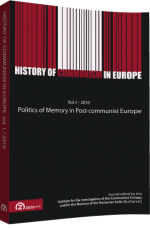Revolution without revolutionaries? On the debate about the nature of the upheaval in 1989-90 in the GDR and its protagonists ...
Revolution without revolutionaries? On the debate about the nature of the upheaval in 1989-90 in the GDR and its protagonists ...
Author(s): Peter WeissSubject(s): History
Published by: Zeta Books
Keywords: culture of memory; Germany; East-German uprising; the civil rights movements; exhibition
Summary/Abstract: There is no doubt about the particular importance of the revolution of 1989 in the present German memory culture. The historical research is reaching an agreement on the question concerning the various factors bringing birth to the East-German uprising 20 years after this incident: the economical crisis, the mass emigration, the civil right movement, the mass protest movement, the reform movement in the grass roots of the SED and the strict refusal of any reforms in the SED leadership. But there are still controversial debates about the historical evaluation of the separate factors. Especially the actual role of the civil rights movement is considered an open-ended question. In this context former civil rights activists are arguing against its marginalisation and the national narrative of “1989”, which is dominated by the German unification. The article will focus on the present themes and forms of memory of the East- German revolution of 1989.
Journal: History of Communism in Europe
- Issue Year: 2010
- Issue No: 1
- Page Range: 225-243
- Page Count: 19
- Language: English
- Content File-PDF

